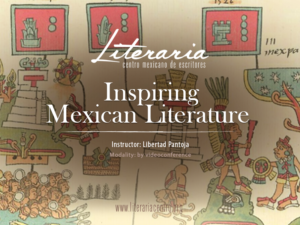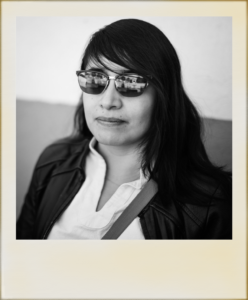This course aims to inspire enthusiastic readers to discover Mexican literature through the extensive review of fundamental stories and novels of Mexican literature.

The selected readings have the following characteristics:
- All of them are from Mexican authors.
- They promote a sense of wonder, mesmerizing enchantment, or deep despair.
The readings will be done in English. The course follows a sense of discovery. It reviews established authors as well as works of the strange and the inexplicable through a path that mimics the instructor’s way through literature. Literature changes you and wounds you. It induces a desire to find out who you are.
Start: Saturday January 21. It is taught on Saturdays from 11:45 a.m. to 13:15 p.m. (Mexico City time).
Modality: by videoconference
Duration: 8 sessions of an hour and a half each.
Course price: $190 dollars
Teaches: Libertad Pantoja (CDMX, 1987) is a Mexican author and technical writer. She graduated in Literary Writing from Literaria: Centro Mexicano de Escritores. Libertad received the FONCA Young Creators scholarship in 2018 in the short story specialty and in 2021 in the novel one. She has participated in the «Under the Volcano» writing program thrice. Some of her stories appear in the anthologies «Historias de las historias» (Ediciones del ermitaño, 2011) and «Lo fantástico no existe» (Ediciones Periféricas, 2021). She has published in the magazines Penumbria, Temporales, and Literaria, as well as in the popular science sites «Más ciencia por México,» «Historias Cienciacionales,» «Cienciorama» and «Hypatia.» Malabar Editorial published her first short stories collection, “Tú, enfermo no estás”, in 2021.

Once payment has been made, please fill out the following form:
Do you need another payment method? Please send an email to literariacentro@gmail.com
Sessions
1. The Future vs the Establishment. Juan José Arreola and Carlos Fuentes.
Juan José Arreola:
- The Rhinoceros
- Baby HP
- The Toad
Others:
- The Switchman
Carlos Fuentes:
- The Doll Queen
- Aura
We will talk about Juan José Arreola and Carlos Fuentes in the Mexican literature context. The instructor will share her first impressions of Juan José Arreola and Carlos Fuentes when she was in high school and later when she started to attend a writing workshop. The objective is that the participants can identify how first impressions and preferences are not always the best norths to find what helps us the most in our reading journey.
During this session, the participants will share their impressions regarding Arreola’s and Fuentes’ writing and how they consider it relates (or not) to their main influences.
The participants will read The Toad, and the instructor will explain how the author influenced her.
2. The Idealistic Darkness and the Violence. Rosario Castellanos, Fernanda Melchor, and Gabriela Damián Miravete.
Fernanda Melchor
- This is not Miami
Gabriela Damián Miravete
- Future Nereid
Rosario Castellanos
- Cooking Lesson
We will discuss the different reasons to write and what we aim to do with our writing. In this context, the instructor will share her first impressions of Cooking Lesson, Future Nereid, and This is not Miami and how these texts made her think about the different possibilities of writing.
The objective is that the participants can identify how different writers have different reasons to write and which one suits their reading or writing experience better.
3. The influence of real life in writing. Dueñas, Inés Arredondo, and Elena Garro.
Guadalupe Dueñas
- The Rats
- Guide Through Death
Inés Arredondo
- The Shunammite
Elena Garro
- Blame the Tlaxcaltecs
We will talk about the influence of real life in writing. Guadalupe Dueñas used to say that she never wrote fiction and that everything that she wrote happened to her. We will discuss how real life influences the writer’s works and how they wrote about their real life and enlivened their writings. T
4. The Establishment 2.0. The magic of the Unknown. Juan Rulfo.
- The Burning Plain
- Tell them not to Kill Me
- They Have Given Us the Land
- Pedro Páramo
We will talk about how the revolution changed literature in Mexico and how Juan Rulfo stands (sometimes out of comprehension) as part of the main Mexican Literature.
5. Literature and the Otherness in the Desert. Jesús Gardea.
Jesús Gardea.
-
- Angel of our Summers
- All
The participants will share what literature means for them and how they came to that idea.
The objective is that the participants can start questioning what literature is.
6. Literature and the Otherness in the Desert. Mario González Suárez and Efrén Hernández.
Mario González Suárez
- Sourceless River
Efrén Hernández
- Tachas
The participants will share what literature means for them and how they came to that idea.
The objective is that the participants can start questioning what literature is.
7. Alone by Many Lovers. Juan Vicente Melo, José Revueltas and Francisco Tario.
Juan Vicente Melo
- Fragments
José Revueltas
- The Little Doe
Francisco Tario
- The Night of Margaret Rose
These three writers revolve around death and loss.
The objective is to make the participants aware that reading writings out of their comfort zone is good.
8. The Other Worlds and What Comes Next. Yuri Herrera.
- Kingdom Cons
- Signs Preceding the End of the World
We will share the final remarks on what we have learned about Mexican literature, how it can inspire us to read, and the drawbacks of reading translated versions and finding good translations. The instructor will share her impressions on the new wave of Mexican literature and encourage the students to share their impressions of how Yuri Herrera relates (or not) to the texts they chose at the beginning of the course.
Bibliography
Sun, Stone, and Shadows: 20 Great Mexican Short Stories, Hernández, J.F., ISBN 9789681685942, Big read, 2008, FCL/FLM.
Underground River and Other Stories, Inés Arredondo, Translated by Cynthia Steele, University of Nebraska Press, 1996, ISBN 0803210345, 9780803210349, 128 pages
